-
IP addresses are NOT logged in this forum so there's no point asking. Please note that this forum is full of homophobes, racists, lunatics, schizophrenics & absolute nut jobs with a smattering of geniuses, Chinese chauvinists, Moderate Muslims and last but not least a couple of "know-it-alls" constantly sprouting their dubious wisdom. If you believe that content generated by unsavory characters might cause you offense PLEASE LEAVE NOW! Sammyboy Admin and Staff are not responsible for your hurt feelings should you choose to read any of the content here. The OTHER forum is HERE so please stop asking.
You are using an out of date browser. It may not display this or other websites correctly.
You should upgrade or use an alternative browser.
You should upgrade or use an alternative browser.
#OccupyCentral thread: Give me Liberty or Give me Death!
- Thread starter Asterix
- Start date
- Joined
- Nov 13, 2014
- Messages
- 272
- Points
- 0
Occupy Central protests blamed for increase of cyberbullying in Hong Kong
Complaints to watchdog soared last year with police and their families among targets and most incidents said to be political in nature
PUBLISHED : Tuesday, 27 January, 2015, 10:07pm
UPDATED : Wednesday, 28 January, 2015, 4:49am
Ernest Kao [email protected]
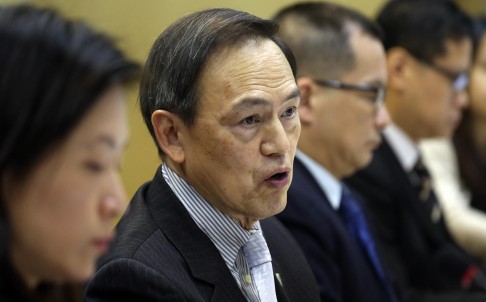
Allan Chiang says the soar in cyberbullying is an alarming trend which has been exacerbated by Occupy Central.
Complaints to the privacy watchdog about cyberbullying soared last year amid the Occupy Central protests and heightened political tensions in the city.
Technology-related complaints rose from 93 in 2013 to 206 last year, with a fourfold increase in cyberbullying, the privacy commissioner for personal data revealed.
At least 28 out of 34 complaints of cyberbullying - a fivefold increase from 2013 - were either related to the Occupy movement or of a "political" nature. Some police officers and their families were targeted, as well as Occupy supporters.
"This is an alarming trend which has been exacerbated by … cyberbullying involving the two opposing camps of the Occupy Central movement," commissioner Allan Chiang Yam-wang said. "Some internet users' behaviour in this regard clearly amounted to blatant misuse of personal data and serious invasion of privacy. Such behaviour should be condemned."
Overall, the commissioner's office received 1,702 complaints last year - a slight drop from the 1,792 in 2013 - mostly over unapproved use of personal information and data collection.
In one case, a real estate agent disclosed the home address of Scholarism founder Joshua Wong Chi-fung - a prominent figure in the 79-day Occupy civil disobedience movement - prompting 18 complaints from the public. But as the student group leader later clarified this was not his real address, the office did not pursue the case.
Chiang said cases of cyberbullying did not always "fit squarely within the bounds of the Personal Data (Privacy) Ordinance".
"It may involve criminal intimidation, infringement of intellectual property rights and defamation … in [some] cases, you may need to approach police or make a civil claim," he said.
Most times, Chiang said, cases would close because complainants were not the actual victims of cyberbullying or there was simply a lack of evidence.
Complaints against banks and financial services still accounted for the bulk of all complaint cases last year followed by property management and telecoms companies.
Complaints over direct marketing calls dropped by half to 277 cases last year but were still flagged as a major issue.
The watchdog issued 20 warnings and 90 enforcement notices to organisations and 20 complaints were referred to police for criminal investigation. Just one conviction was made.
Chiang urged the government to implement section 33 of the ordinance, which would prevent personal data from being transferred across the border.
- Joined
- Nov 13, 2014
- Messages
- 272
- Points
- 0
Occupy Central changed the way Hongkongers think, says artist
Birdy Chu's multimedia show, It's just the beginning, at the Goethe-Institut Hongkong, documents the democracy protests from different angles
Vanessa Yung [email protected]
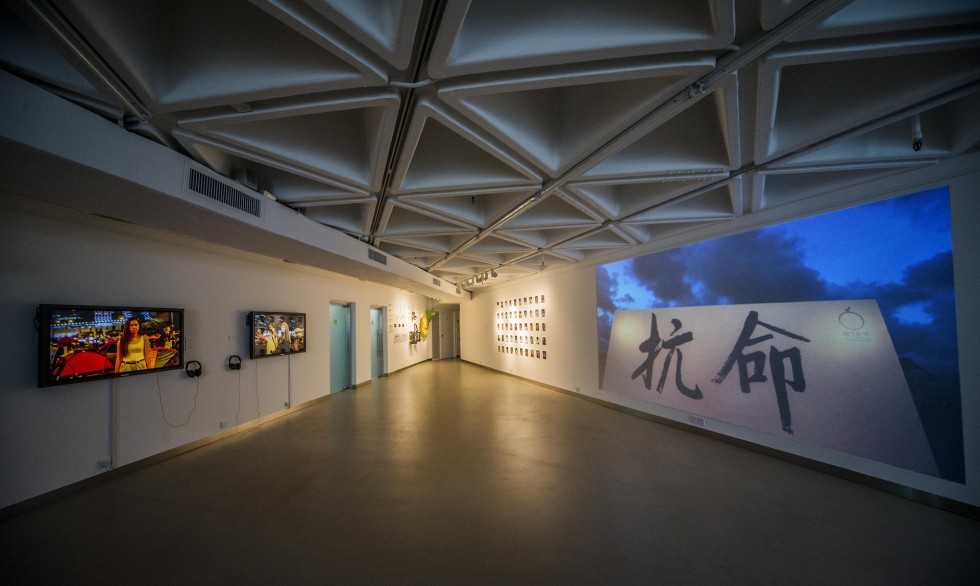
They started something: works from Birdy Chu Shun's exhibition (above and below).
IT’S JUST THE BEGINNING
Goethe-Institut Hongkong
Birdy Chu Shun is no stranger to tear gas assaults. A former journalist, Chu witnessed the 2005 anti-WTO protests by South Korean farmers in Wan Chai and, seven years later, the anti-Japanese demonstrations in Shenzhen. Tear gas was used on both occasions. But nothing stunned Chu as much as what happened on September 28, 2014, the day that kick-started the umbrella movement.
"The fact that the police fired tear gas at the Occupy Central protesters changed everything. It incubated what happened in the following months," says Chu, a photojournalist, videographer, and media lecturer at HKU Space Centre for Degree Programmes. "It triggered people's anger, which has more to do with the shock of what the police did than any physical pain inflicted."
Chu has a knack for capturing arresting visuals of the city's socio-political scene. In 2013, he published a book titled I walk therefore I shoot: a record of Hong Kong demonstrations. This time, the result of his chronicling the civil disobedience sit-ins is a multimedia exhibition at the Arts Centre.
The month-long show is made up of photography, short films and multimedia installations. Instead of using a straightforward documentary approach, Chu — using his graphic design background — gives all his works an artistic twist to enhance interest and pique contemplation.

A video playing on a television is called Can you hear the students speak? For this, the video footage and audio recordings were made separately. The interviewees stare directly into the camera and maintain static expressions, but on the audio soundtrack they talk passionately about their yearnings for democracy.
One wall is lined with student portraits collected from 50 people from different walks of life — the number is an allusion to Central government's futile "50 years unchanged" promise — as a tribute to the virtual support offered by the viral social media campaign.
Another wall features an installation Chu created using art pieces and handicrafts donated by protesters. "I documented the whole movement from many angles, and interviewed occupants who had unique ways of participating in all three districts. All this is shown in my short film, which will be projected in the Black Box Studio. I've concluded that there are many other possibilities for Hong Kong," says Chu.
"Hong Kong people are too obedient. Who says Hong Kong has to be the way it has been? The way that the protesters occupied roads has been transformative — who would have thought you could ever take a stroll up a flyover? This is essentially a city redesign. It is a way of thinking that can be expanded to a much broader scope. Politicians may see it as a threat, but for the rest of us, it's a breakthrough in the way we think about things," Chu says.
14/F Hong Kong Arts Centre, 2 Harbour Road, Wan Chai, Monday-Friday, 10am-8:30pm Saturday, 1pm-6pm. Until February 11. Inquiries: 2802 0088
- Joined
- Nov 13, 2014
- Messages
- 272
- Points
- 0
Role reversal as Occupy protester turns himself in to police
Cliff Cheung Chi-fai, who went to police headquarters regularly during almost 30 years in disciplined services, will assume different role during Friday's visit.
PUBLISHED : Thursday, 29 January, 2015, 11:48pm
UPDATED : Friday, 30 January, 2015, 12:20am
Jeffie Lam [email protected]
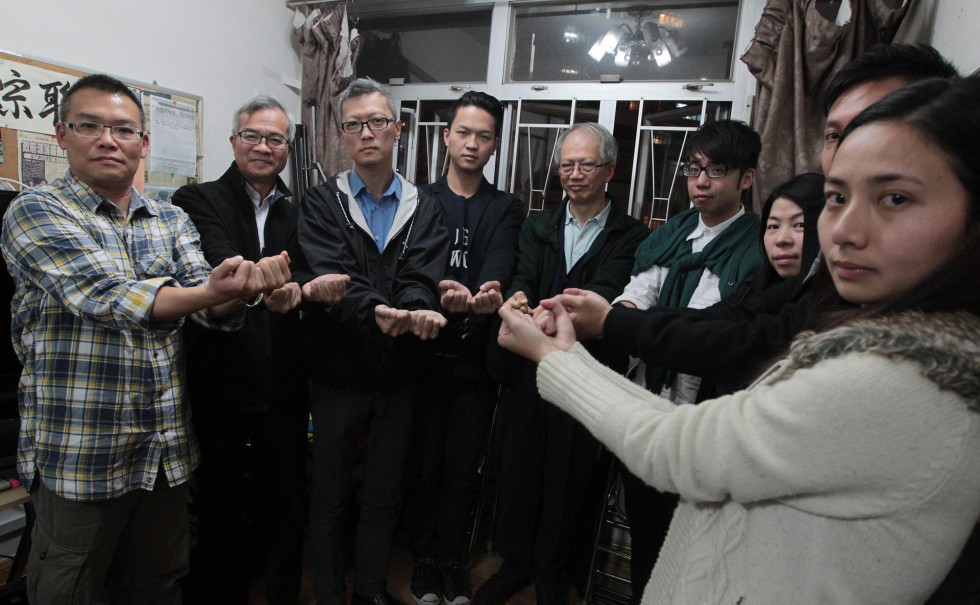
Cliff Cheung, left, is among the Occupy volunteers who plan to surrender at police headquarters on Friday.Photo: Bruce Yan
Cliff Cheung Chi-fai used to visit police headquarters regularly during almost 30 years in the disciplined services.
On Friday he will go to the same building in a completely different role - to turn himself in for allegedly taking part in an unauthorised assembly.
Cheung, who retired this year, is among some 10 devoted Occupy Central volunteers from across generations who plan to surrender en masse for participating in the months-long pro-democracy sit-in. They hope their display of unity will prompt more people to join the democracy movement in the future.
"The environment [of police headquarters] might not be too foreign to me and basically I know what the procedure will be like," said Cheung, an Occupy marshal at the Admiralty protest site.
"I just hope my friends [in the force] will perform their duties."
The 55-year-old retiree, who refused to disclose which branch of the disciplined services he worked for, expressed regret that Chief Executive Leung Chun-ying and Police Commissioner Andy Tsang Wai-hung had placed frontline police officers in confrontation with pro-democracy protesters.
"We used to stand in the middle, trying to assist the protesters to reflect their calls," Cheung said. "But now when I look at [the officers'] eyes … I feel like we are forever the enemy.
"Now the movement is over, it's time for me to mark a full stop to my civil disobedience," said Cheung who added that he planned to continue his fight for democracy.
The end of Occupy protests are widely regarded as a new beginning for the volunteers.
"I always believed civil disobedience could trigger a moral awakening," said Andy Wong Hiu-hei, an information technology officer who visited the occupied sites after work every night.
"I hope [my surrender] will prompt my kith and kin to think about what's going on in our society … I hope my friends who did not stand up last time will devote more … in the future."
Fung Tak-wah, in his late 50s, said: "I used to think my students were rather passive … but now my impression on them has been changed completely," Fung said.
"We have failed to achieve it in the past, but perhaps they can make it in future."
- Joined
- Nov 13, 2014
- Messages
- 272
- Points
- 0
13,000 pro-democracy activists take to the streets as first post-Occupy march kicks off
PUBLISHED : Sunday, 01 February, 2015, 2:39pm
UPDATED : Sunday, 01 February, 2015, 10:42pm
Tony Cheung, Ernest Kao, Samuel Chan and Phila Siu
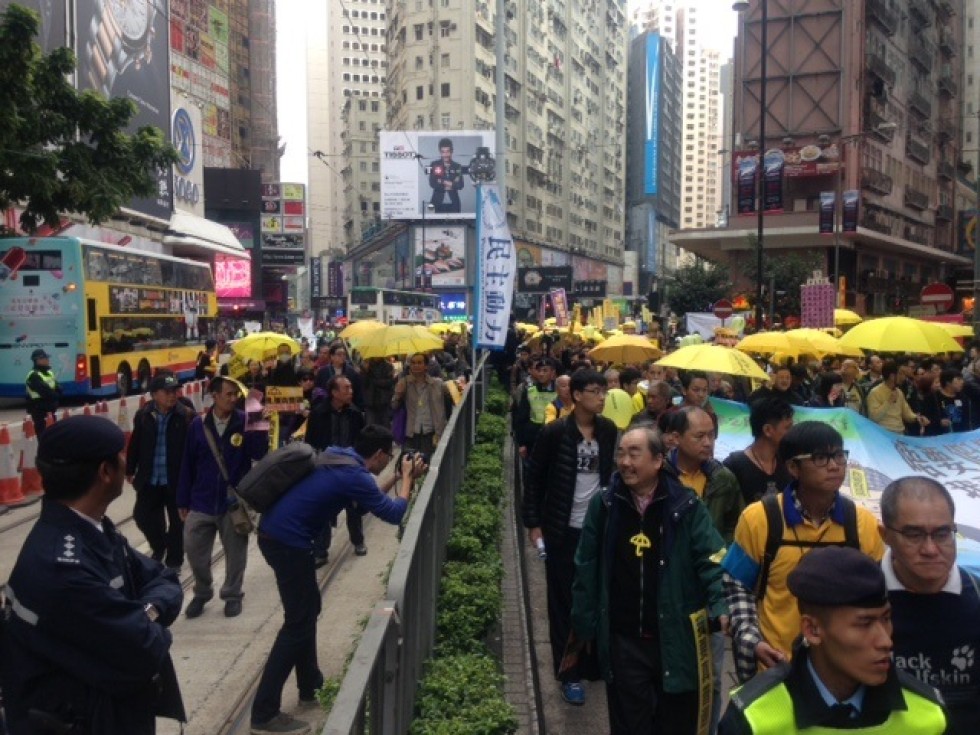
Police opened four lanes, one more than usual, outside the Sogo department store, in an apparent effort to avoid the location from turning into a bottleneck. Photo: Tony Cheung
Thousands of pro-democracy activists took to the streets of Hong Kong today during the first major post-Occupy Movement mass rally this afternoon.
Supporters and members of the Civil Human Rights Front gathered at Victoria Park before 2pm while stickers, banners, placards and balloons all paying homage to the "Umbrella Movement" abounded. At 2.20pm, the march began with the head of the rally leaving Victoria Park's eastern entrance through Tin Hau.
Leading the charge were key figures of the Occupy Central movement including Benny Tai Yiu-ting, Chan Kin-man and Reverend Chu Yiu-ming. Others at the front included Democratic Party founding chairman Martin Lee Chu-Ming as well as Daisy Chan Sin-Ying.
The Civil Human Rights Front put the turnout at 13,000, double the police estimate of 6,600 marchers setting out from Victoria Park and 8,800 at the march's peak.
The University of Hong Kong’s Public Opinion Programme estimated that the turnout was about 11,000 to 12,000 – lower than the New Year’s Day march in 2013 and 2014.
"The [turnout] is indeed fewer than what we expected, but this only shows that Hongkongers are no longer satisfied with conventional ways of protest," Daisy Chan Sin-Ying said.
"It doesn't mean Hongkongers will pocket whatever [proposal] that's on offer," she said, "We will review whether the people want new ways to pressure the government... If the people are tired with taking part in marches; it’s not the front which is in trouble, but the government... I am confident Hongkongers will show up again when the right moment comes."
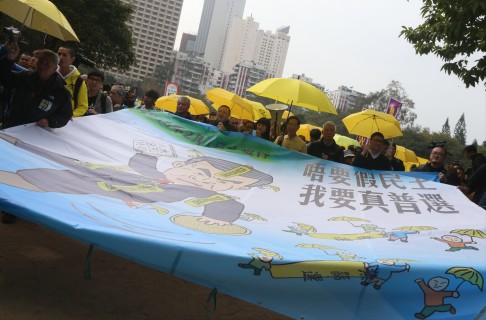
Protesters hold a head banner that appeals for "genuine universal suffrage" as they march from Victoria Park. Photo: Felix Wong
March participants held up a large banner with a caricature of Chief Executive Leung Chun-ying and the words "reject fake democracy, we want real universal suffrage" sprawled on it. As more people joined the procession in the later afternoon, Chan gave an emotional speech, calling on "the support of everyone".
"We can't depend our fight for democracy on the teenagers...I hope I will be able to see real democracy in my life," she said. "We won't stop until genuine universal suffrage comes."
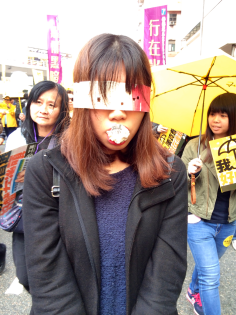
Jessie Tam, a 21 year-old university student, joined the protest with pieces of paper covering her eyes and stuffed in her mouth. "It is to echo the government's attempt to silence us," Tam explained. Photo: Tony Cheung
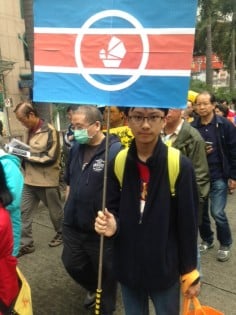
14-year-old Gabriel Lam designed a "North Korean" Hong Kong flag."Hong Kong is becoming more and more like North Korea," Lam said, "because the democracy that officials talk about seems fake just like North Korea, which also boasts to be a 'democractic' people's republic." Photo: Tony Cheung
Housewife Carol Leung, 34, who joined the march alone, said she was marching because she was "afraid" for her 8-year-old son’s future.
"I don’t want him to grow up in a city where he will go out on the street and suddenly be beaten by the police. I am afraid that Hong Kong will become like [mainland] China ," she said. "I am pushing him to study harder so he can go overseas for school when he is older."
As the marchers proceeded past the Hong Kong Central Library, an 83-year-old man hurled insults at them, screaming: "The SAR government is already treating us so well. We have freedom of speech and the government has given us sweeteners before when there was a surplus. What else do you want? Hong Kong has never been more prosperous before."
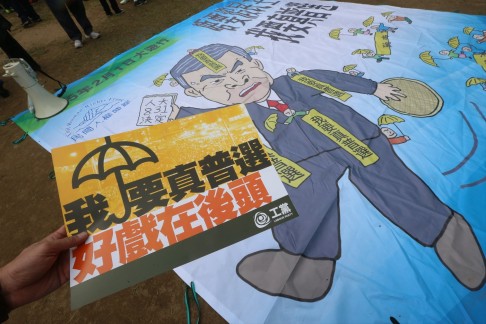
A poster from the Labour Party that appeals for "genuine universal suffrage". Photo: Felix Wong
Eric Fok, who works in the financial sector, said he supported the marchers but doubted if rallies could help achieve genuine universal suffrage.
"I support them. I support the Umbrella Movement...and I didn't understand why [Chief Executive] Leung Chun-ying hit out at the University of Hong Kong’s student magazine Undergrad. Hong Kong is becoming like the mainland," he said as he looked upon the marchers outside the library.
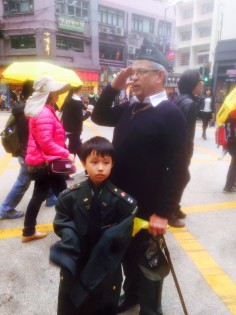
Pastor and former US Army veteran Bob Kraft. Photo: Ernest Kao
Others, like pastor and former US Army veteran Bob Kraft, saluted the protesters as they passed through Causeway Bay.
Kraft, who made a name as "the pastor of Civic Square" during the 79-day Occupy Movement and is no stranger to local protests, said he wanted Hong Kong to have freedom from fear. He said the turnout seemed lower than he expected but the important thing was that people had come for the right reasons.
"Many people in Hong Kong are becoming afraid. Afraid of the government, the police, of teachers... Citizens should not be afraid to make their own choices," said Kraft, who was stationed in Berlin, Germany during the latter part of the Cold War. "We are all here for the moment. You can't take away someone's rights in their heart."
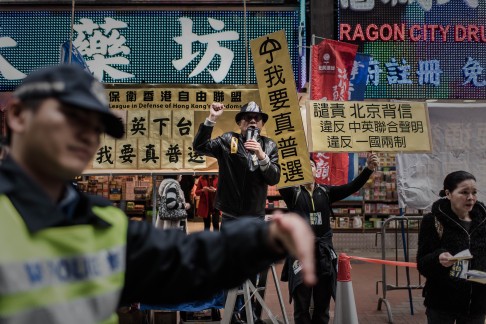
A policeman direct pedestrians as demonstrators shout slogans before the Sunday march for democracy in Hong Kong. Photo: AFP
Meanwhile, shops and retailers remained divided on whether protests would be an effective force for change.
"Many people have become antagonistic to such demonstrations," said Alan Yu King-bun, a shop manager at Ko Lai Tong, a Korean snack shop on Yee Wo Street, which opened under a short-term lease just a week after the Occupy camp on the same road was cleared.
"It's annoying, it affects our business and to be honest, they won't be able to achieve anything."
He said he was concerned that another round of civil disobedience could return to Causeway Bay if an Occupy-style movement were to break out today. Although Yu's store is on a temporary lease, monthly rents for the ground floor shop remain in the area of HK$100,000, and mainland tourists make up about 70 per cent of business.
"Many students are already done with their [winter] exams so there is a higher risk right now. We are concerned but there's nothing much we can do."
Jason Pang, the owner of bag and luggage store The P&L Company on nearby Causeway Road was more sympathetic.
"They have an objective so even if it did affect our business a bit, we'll still accept it," said Pang. He said many people were frustrated with the government, including small business-owning middle class citizens like himself.
"The government must look out for all strata of society, not just their rich friends."
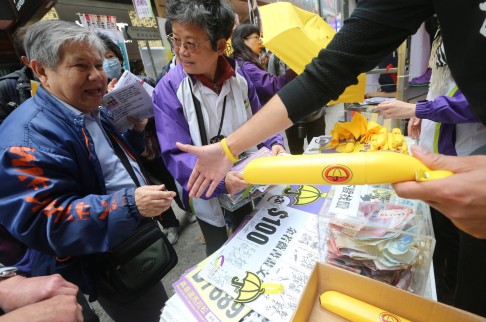
Yellow umbrellas from Hong Kong's Occupy Movement are passed out to marchers. Photo: Felix Wong
Around 6.15pm, a group of People's Power members split off from the main rally and appeared at Government House, the residence of the Chief Executive, to demand genuine universal suffrage.
The group, led by Albert Chan Wai-yip and other members including Tam Tak-chi and Erica Yuen Mi-ming, attempted to stick "fai chuns" - small red banners usually written with lucky messages - with the words "I want real universal suffrage" onto the compound's walls.
Previously, Chan Wai-yip had said that People's Power members were going to pay their Lunar New Year blessings to Leung Chun-ying two weeks early and urged citizens to do the same.
League of Social Democrats' activist Lui Yuk-lin, also known as the female "Long Hair" for her radical antics similar to Leung Kwok-hung, threw eggs and hell money, while guards quickly shut the gate of the compound and dozens of police pushed the protesters away from the entrance.

Members of People's Power at Government House. Photo: Ernest Kao
A police source told the Post that about 2,000 police officers fanned out between Causeway Bay and Central to monitor the mass rally, readying reinforcements to deploy in case of major unrest. These included officers who were involved in the Solarpeak operation that dealt with the Occupy protests, the source said.
During the rally, police officers stood on guard every few metres, but appeared to be less tense than they were during the Occupy sit-ins. The protesters also did not chant slogans to insult the officers, in contrast to when Occupiers accused officers of being "black police" during last year's protests.
Chan, however, said that police "stopped at least three organisations" from setting up booths along the route. These three organisations included the Democratic Party, Labour Party and one concern group.
"In the past, booths could be set up as long as they occupied only one lane of the street," she said.
Chan said the Civil Human Rights Front currently has no plans to stage any civil disobedience actions but it would offer its full support to Democratic Party lawmaker Albert Ho Chun-yan's resignation plan to trigger a de-facto referendum later this year.
She also added that the Front might not organise the annual march on July 1 if police imposed unprecedented restrictions deemed unreasonable. Instead, the Front may organise a rally or protest in other "more creative" ways if police are uncooperative.
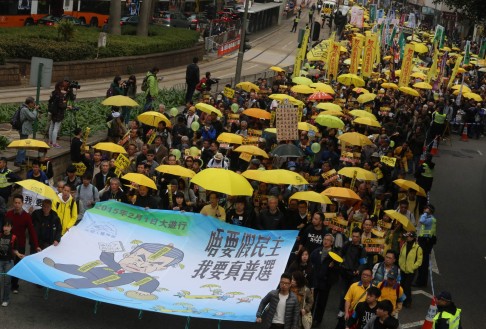
Up to tens of thousands of people took to the streets in the first major rally since the Occupy Central sit-ins. Photo: Felix Wong
Meanwhile, the pro-government group Defend Hong Kong Campaign announced that its members would call for residents to support the government’s political reform efforts in different districts on Sunday, but would not be doing so in Wan Chai or Causeway Bay to avoid clashing with marchers.
In response to the rally today, a government spokesman said the following: "The Hong Kong Special Administrative Region (HKSAR) Government calls on all sectors of the community to adopt an accommodating, rational and pragmatic approach, as well as an inclusive attitude to express views [and] to forge consensus so that 5 million eligible voters can elect the Chief Executive by universal suffrage through 'one person, one vote' in 2017."
- Joined
- Jun 16, 2013
- Messages
- 58
- Points
- 0
How will Hong Kong pro-democracy protests affect district elections?
Pan-democrat and pro-establishment camps agree on one thing: nobody is sure what Occupy means for November's district council elections
PUBLISHED : Monday, 02 February, 2015, 12:36am
UPDATED : Monday, 02 February, 2015, 6:47pm
Tony Cheung [email protected]
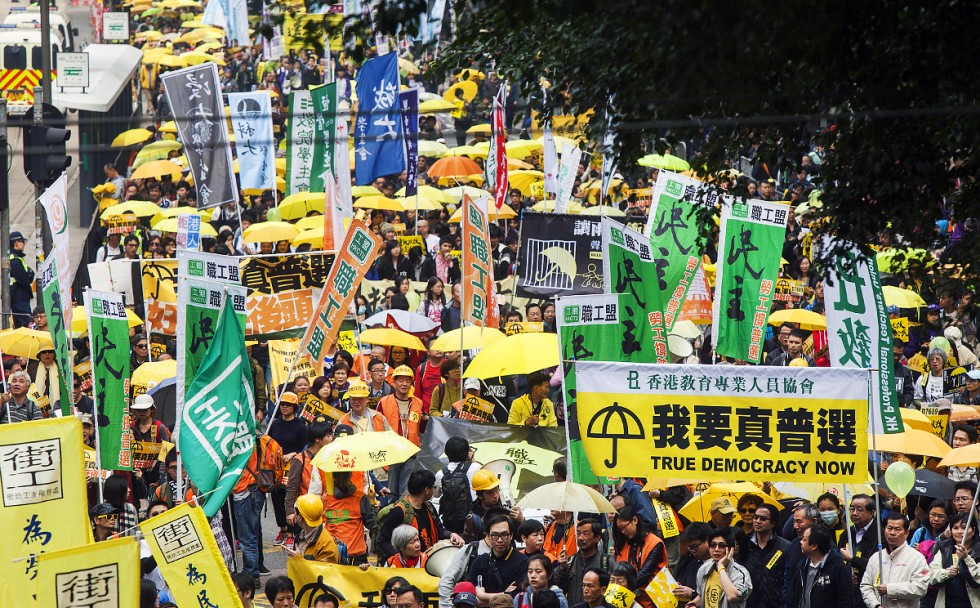
Thousands of pro-democracy activists take part in a democracy march to Central. Photo: AP
The Occupy Central protests sparked a fierce tussle between the two sides of the political divide. Pan-democrats hailed a "civic awakening" while their pro-establishment rivals mobilised supporters to condemn the 79-day street blockade as an affront to the rule of law.
Yet more than a month after the sit-ins ended, both camps are reluctant to say whether the civil disobedience campaign will help or hinder them in the first big electoral test of the post-Occupy era - November's district council elections. In a rare note of agreement, both camps say events to come will have a bigger effect on voters, while the extent to which a political awakening among the city's youth will lead them to turn out to vote remains unclear.
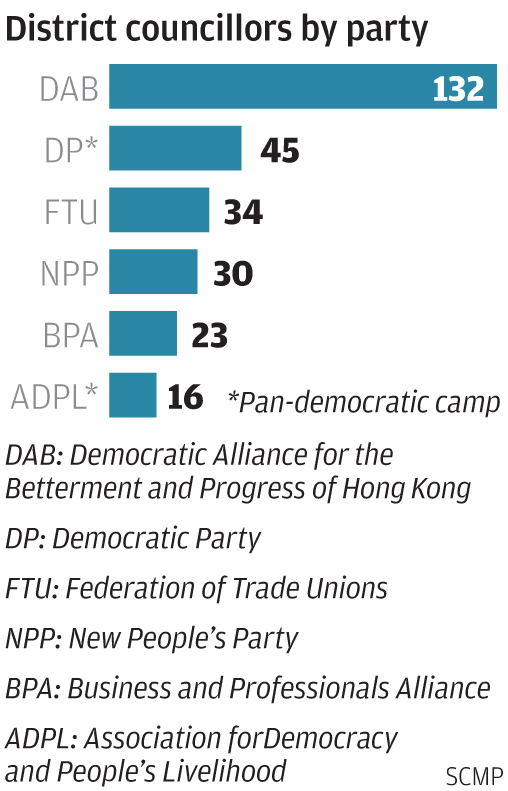
The pro-establishment camp dominates all 18 district councils, holding about half of the 412 directly elected seats. More than 80 are in the hands of pan-democrats. Independents hold the rest, while the councils also contain 95 ex officio or appointed members. While councils have little formal power, they will play a key role in next year's Legislative Council election, at which six seats go to district councillors including five so-called super seats, elected in a citywide ballot of three million voters.
On the pan-democratic side, Association for Democracy and People's Livelihood chairman Bruce Liu Sing-lee fears a "landslide" loss for the camp.
"The umbrella movement was a double-edged sword: residents support its fight for democracy, but it also blocked road traffic [in Admiralty, Causeway Bay and Mong Kok]," Liu said. "The district councils deal with lots of livelihood issues, which were not helped by the movement."
However, Democratic Party lawmaker and Wong Tai Sin district councillor Wu Chi-wai says it is too early to call.
"Political factors usually kick in late into the run-up, so we must do the basics first," Wu said, referring to grass-roots work by councillors, helped by the party's 50 or so community officers.
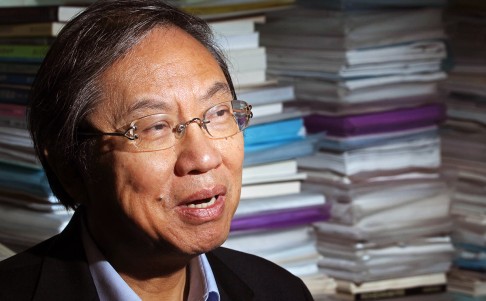
Joseph Cheng is optimistic for the pan-democrats. Photo: May Tse
Professor Joseph Cheng Yu-shek, a political scientist responsible for coordination among pan-democratic parties, shared Wu's view. While pan-democrats were "not optimistic" about the vote, that was mainly because of their financial disadvantage.
And despite that shortcoming, Cheng believes two factors could work in favour of the pan-democrats. Firstly, the 27 pan-democratic lawmakers are likely to vote down the government's political reform package. Secondly, young people, including first-time voters, are showing enthusiasm for the polls.
Pan-democrats have vowed to deny the government the two-thirds majority it needs if it insists on a model for the 2017 chief executive poll based on Beijing's framework, under which voters would choose from two or three candidates picked by a 1,200-strong committee.
"Half a million took to the streets on July 1, 2003, and the pan-democrats won a landside victory in the district council poll four months later, could that happen again this year?" Cheng said, referring to mass protests against an ill-fated national security bill that year.
He said pan-democrats would continue to encourage young people to register and vote in the district council poll.
And the youth vote is also on the minds of pro-establishment groups, who traditionally rely on an older support base. Their fears were stoked by the strong role youth groups such as the Federation of Students and Scholarism played during Occupy.
Horace Cheung Kwok-kwan, vice-chairman of the Democratic Alliance for the Betterment and Progress of Hong Kong, said: "Some people are saying that even if Occupy Central worked in favour of [our] camp … the favourable [sentiment] is fading.
"But when more young people are becoming voters, we don't know how they will vote," said Cheung, whose party is by far the biggest in the districts.
New People's Party chairwoman Regina Ip Lau Suk-yee cited government's figures which showed that more than half of about 77,000 new voters who registered last year were aged between 18 and 20.
"We will have to look at the new figures this summer … and consider the demographics of each constituency," she said.
But her vice-chairman, Sha Tin district councillor Pun Kwok-shan, said he would remind potential candidates to put the groundwork in, as it was their work not their stance on Occupy that tended to win local elections.
"Voters might be against those illegal acts, but it doesn't mean that they will vote for you … [just] because you are pro-establishment," Pun said.
- Joined
- Jun 16, 2013
- Messages
- 58
- Points
- 0
Hong Kong businesses hurt by democracy protests to get relief in budget
Across-the-board government giveaways expected to compensate companies that suffered losses during 79-day mass protest
PUBLISHED : Wednesday, 04 February, 2015, 3:24am
UPDATED : Wednesday, 04 February, 2015, 7:20pm
Gary Cheung and Joyce Ng
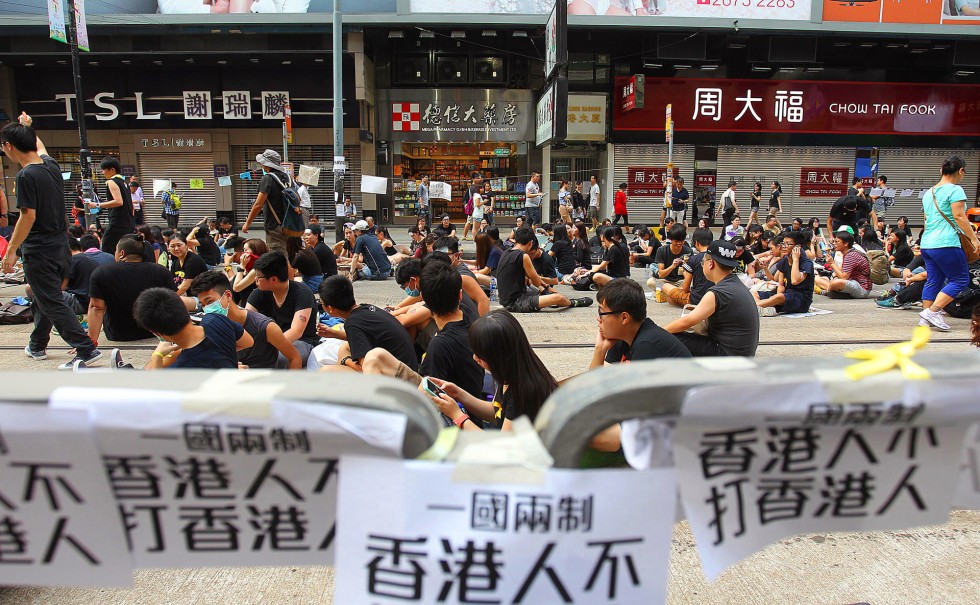
It will take two years for affected restaurants to make up lost profits after Occupy. Photo: May Tse
Financial Secretary John Tsang Chun-wah will use his budget later this month to unveil one-off relief measures - such as reductions or waivers of certain fees and charges - to help industries affected by the Occupy Central protests, a person familiar with the situation told the South China Morning Post.
Logistics and catering are among the sectors that are expected to benefit from the government giveaways. Tsang said early last month that he would look into ways of helping businesses that were hit by the 79-day mass sit-ins in his budget speech on February 25.
The relief measures would be across the board rather than specifically targeting companies operating in districts where the Occupy protests took place.
Tsang had said the government must compensate businesses in a timely manner to minimise the negative impacts on the city's economy.
The source said the relief measures would not specifically target companies located in districts affected by Occupy protests as it would be difficult to implement such measures.
"If companies located in certain districts benefitted from relief measures, others in other districts would ask why they are left out," the source said.
"But the scale of the reduction or waiver of fees will not be large. The government wants to use this opportunity to respond to the concerns of sectors hit by the Occupy protests," the source said.
Some businesses complained of falling incomes and a worsening trading environment during the Occupy protests.
In December, the Federation of Restaurants and Related Trades, which represents about 6,000 restaurants and bars, blamed the Occupy movement for a loss in business of more than HK$3 billion since it began in late September, when main roads in core commercial areas of Mong Kok, Admiralty, and Causeway Bay were blocked. The sit-ins ended on December 15.
The loss was roughly 3 per cent of the turnover of the sector in a year, and the federation said it could take affected establishments up to two years to make it up, given thin profit margins.
But the impact on the retail sector during Occupy was not as big as some expected. While the protests were under way, retail sales increased by 1.4 per cent year-on-year for October and were up 4.2 per cent on the same period in 2013. It fell 3.9 per cent year-on-year for December.
Simon Wong Ka-wo, president of the federation, said his sector hoped the government would exempt restaurants from paying the sewage charge or the trade effluent surcharge, the latter of which applies to certain industries including catering.
Wong also called for an exemption of the annual restaurant licence fee, ranging from HK$2,500 to HK$125,800, depending on the shop size.
He suggested a provisional low-interest or interest-free loan to restaurants located in Occupy-hit areas - 1,000 businesses in Central and Western district were affected, he said. The loan would help solve cash flow problems, Wong suggested, adding that those shops would need about HK$300,000 to HK$500,000.
Wong Po-keung, chairman of the Taxi Owners Association, which led an alliance of buses, taxis and trucks that objected to Occupy, said the group wrote to the financial secretary asking him to exempt payment of licence fees for commercial vehicles. Vouchers for fuel would also help, he added.
The Post reported yesterday that Tsang was planning more than HK$20 billion in sweeteners for the public amid global economic uncertainty and a big government surplus.
- Joined
- Jun 16, 2013
- Messages
- 58
- Points
- 0
China's man in Hong Kong Zhang Xiaoming hits out at democracy protests
PUBLISHED : Thursday, 05 February, 2015, 1:41am
UPDATED : Thursday, 05 February, 2015, 4:12am
Peter So and Jeffie Lam

Central government's liaison office director Zhang Xiaoming hits out at democracy protests. Photo: Sam Tsang
Instilling a sense of national pride and belonging in young people should be a priority for the education system in the wake of Occupy Central, Beijing's top official in Hong Kong said yesterday.
In a high-profile speech at the spring reception of the central government's liaison office, director Zhang Xiaoming also warned the city to be wary of attempts to advocate independence or confront Beijing by illegal means.
Last year's 79-day civil disobedience sit-ins dominated Zhang's keynote speech to more than 4,000 guests as he warned against using the city's high degree of autonomy as a pretext to reject Beijing's authority.
He said Occupy had brought a "deep wound to Hong Kong society", but praised the response of the government and police.
"Hong Kong enjoys a high degree of autonomy, but this does not mean that it … could disrespect the central authority's power, that includes the decision-making power on important political issues such as universal suffrage," Zhang said, in reference to the spark for the protests - Beijing's stringent rules on nominations when Hongkongers elect the chief executive for the first time in 2017.
While the city's young people deserved more "love and care", they also needed "positive guidance" to help them understand the nation. Referring to comments President Xi Jinping made on the youth of Macau in December, Zhang added: "Priority should be given to the history, culture and national conditions … in the education of the young people."
Zhang also told his audience - including many Beijing loyalists and business leaders - that there was no need to fear the city being marginalised as the nation's economy developed, as the city's development remained part of the national strategic interest.
Zhang was joined on stage by Chief Executive Leung Chun-ying and former leader, Tung Chee-hwa. However Tung's successor, Donald Tsang Yam-kuen, was in the audience.
Democratic Party chairwoman Emily Lau Wai-hing said Zhang "blurred the boundary" of "one country, two systems" by commenting on issues that were a matter for local leaders.
A handful of pan-democratic lawmakers were invited. The Civic Party's Kwok Ka-ki was denied entry as he held a yellow umbrella - an Occupy emblem.
- Joined
- Jun 16, 2013
- Messages
- 58
- Points
- 0
Police watchdog 'in a difficult situation' in wake of Occupy Central
Former member of complaints council says government cheerleading for force during Occupy protests will make oversight more difficult
PUBLISHED : Monday, 09 February, 2015, 3:17am
UPDATED : Monday, 09 February, 2015, 7:59am
Stuart Lau [email protected]
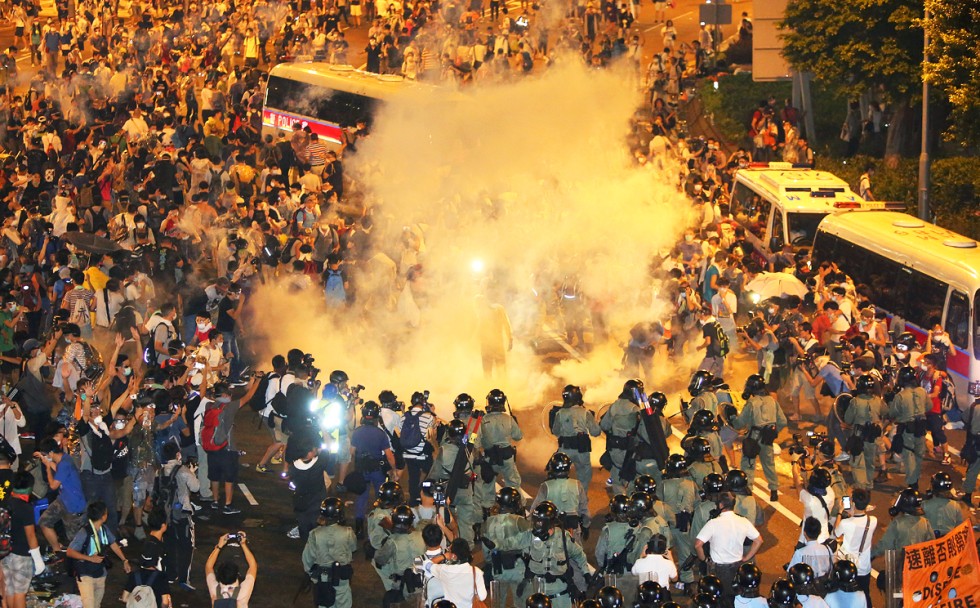
The police fire tear gas to protesters in Admiralty after "Occupy Central" was officially launched on September 28, 2014. Photo: Sam Tsang
Unequivocal support for the police from high-ranking officials has created a "very difficult situation" for the independent watchdog that monitors the force, a newly departed member says.
Eric Cheung Tat-ming, a legal scholar at the University of Hong Kong, called on the Independent Police Complaints Council to remain as fair as it had been in the past, especially with the Occupy protests adding to its workload.
The neutrality of the body was thrown into question after the government appointed mainland-friendly solicitor Larry Kwok Lam-kwong as its chairman last year.
Cheung, who stepped down last month, said: "The whole of Hong Kong is confrontational and politicised. Complaints following the 'umbrella movement' have posed a harsh challenge to the complaints mechanism of the council.
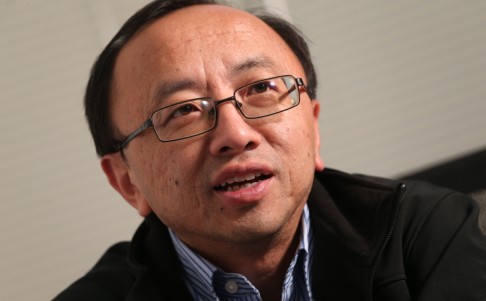
Legal scholar Eric Cheung Tat-ming calls on the Independent Police Complaints Council to remain as fair as it had been in the past. Photo: K. Y. Cheng
"High-ranking government officials' unequivocal recognition [of the force] has put the council in a very difficult situation," Cheung added.
When tear gas was fired on September 30 at the Occupy protesters, Chief Executive Leung Chun-ying asked people to "thank the police force".
That, Cheung noted, set the current political climate apart from that of previous administrations, in which high-ranking police officials were prepared to denounce malpractice among their fellow officers, showing they were willing to cooperate with the police watchdog.
He said the watchdog needed to stay neutral in order to win public trust.
During the Occupy sit-ins last year, police used batons on protesters and attempted to disperse the crowds with tear gas, drawing global media attention.
More than 100 complaints were lodged with the watchdog - compared with about a dozen over the handling of protesters during then vice-premier Li Keqiang's 2011 visit.
"In my six years on the council, there was never any difficulty when it came to members with different political stances working well together. When we made decisions, I couldn't see any political motives. There was no joint attack," Cheung said.
When Kwok's appointment was announced in May last year, Cheung described Kwok - who had spent a decade as a Guangxi province Chinese People's Political Consultative Conference delegate until about two years ago - as an unknown face inside and outside the council.
Stopping short of commenting on Kwok's performance, Cheung slammed the government for a lack of transparency in its appointments and praised Kwok's predecessor, Jat Sew-tong, for his leadership.
Jat would lead discussions on cases by focusing on the evidence like in a courtroom, Cheung said, which meant that members could not bring political beliefs into the process.
"If the council becomes lenient with the police, it is in fact doing harm to them," Cheung said. "If people lose trust in the complaints system, malpractice can no longer be stopped."
- Joined
- Jun 16, 2013
- Messages
- 58
- Points
- 0
PUBLISHED : Tuesday, 10 February, 2015, 12:12am
UPDATED : Tuesday, 10 February, 2015, 12:12am
Guangdong governor downplays Occupy impact, saying protests only caused a 'ripple'
Zhu Xiaodan downplays protest movement's effect on Hong Kong's relationship with the mainland

Mimi Lau in Guangzhou [email protected]
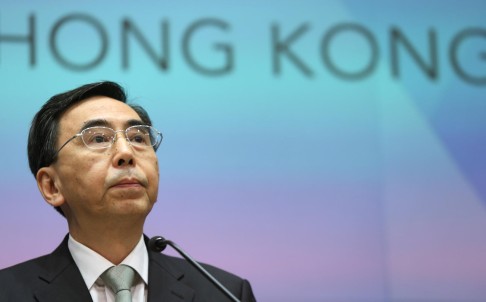
Zhu Xiaodan called for youth exchanges.Photo: Sam Tsang
Guangdong Governor Zhu Xiaodan on Monday played down the impact of the Occupy protests on the relationship between Hong Kong and the mainland, saying the campaign had only caused a "ripple".
He also said he would promote more exchanges between mainland youth and their counterparts in Hong Kong.
Zhu, who is a member of the Communist Party's Central Committee, was speaking to reporters after a meeting of the Guangdong People's Congress yesterday.
"I think it was only a ripple. It will not affect the relations between the mainland and Hong Kong," Zhu told reporters who had asked him if the campaign had affected the mainland's ties with Hong Kong.
He did not elaborate, but said he would like to see more exchanges between young people.
"There used to be exchanges between young people," Zhu said.
"I think we should continue to promote more of these kinds of exchanges, say, students to students, teachers to teachers, and young professionals to young professionals. It is our hope that more Hong Kong young people can come to Guangdong and the mainland to visit."
The 79-day sit-ins ended in mid-December after police cleared the last protesters. The campaign, a protest against Beijing's framework for Hong Kong's 2017 chief executive election, also gave rise to what some saw as an anti-China sentiment among some of the city's youth.
There have been calls for Britain to "take back" Hong Kong, and for Hong Kong to become an independent state.
In an editorial on Monday Global Times, a tabloid owned by the state-run People's Daily, said the idea of "Hong Kong autonomy" should be eliminated.
The commentary said the rise of the autonomy movement stemmed from an anti-Communist Party and anti-reunification sentiment.
But it warned: "It has to be pointed out that 'Hong Kong autonomy' itself is a serious breach of the Basic Law and the [Chinese] constitution."
If the movement gained momentum, the editorial predicted, it would destabilize the city and "harm the young generation, destroy Hong Kong's future."
Additional reporting by Ng Kang-chung
- Joined
- Jun 16, 2013
- Messages
- 58
- Points
- 0
Occupy insiders give their verdict on the protests
The Occupy movement marked a coming of age for Hong Kong's 'millennials', often referred to as strawberries: self-centred, faint-hearted and easily bruised. Mary Hui talks to three women who have helped redefine a generation
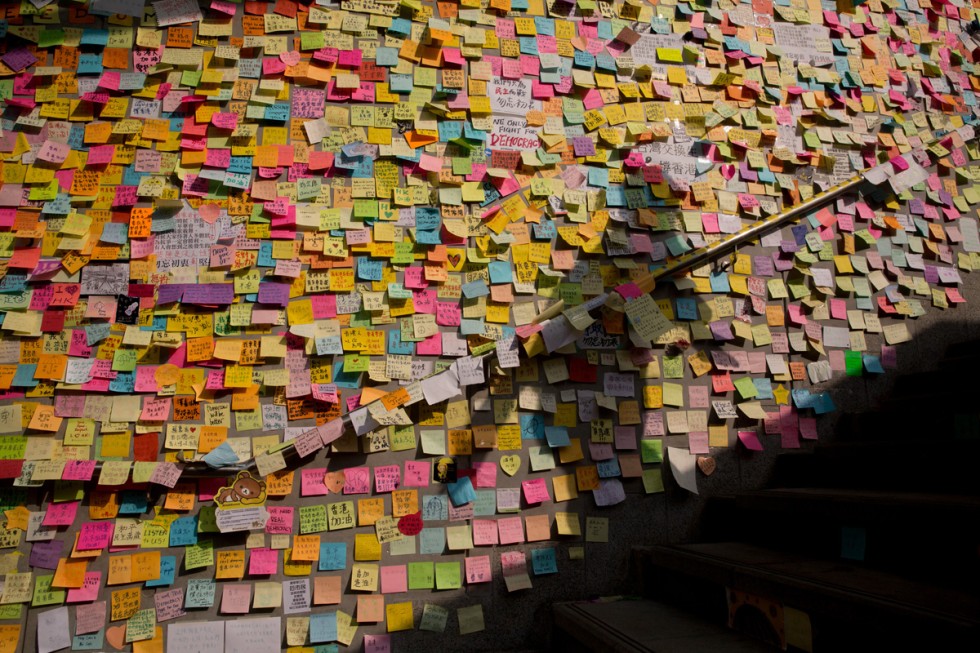
A wall outside government headquarters in Admiralty is plastered with pro-democracy messages in October, at the height of the “umbrella movement”. Photo: Bloomberg
It was around 10.30pm on a Friday night in Hong Kong. Hundreds of students had gathered outside the government headquarters in Admiralty. That week, starting on Monday, September 22, thousands of students across the city had boycotted their classes to protest against a disappointing political reform proposal put forward by Beijing. Now, the city was waiting to see what would happen next: would the movement fizzle out or would it intensify?
Before the students stood a hastily erected three-metre-high fence; beyond was an open area, dubbed Civic Square by the protesters. This was what they had come to take.
Standing on the front line, Gloria Cheng Yik-lam, 20, saw a small gap in the fence suddenly open. Why is not clear, but Cheng, a member of Scholarism, a youth activist group that had played a leading role in the protests, seized on her chance and pushed forward, forcing the gap open wider, and rushed in. Others followed. Some protesters had already found their way in by scaling the fence.
"I was surrounded by police officers as soon as I entered," says Cheng, a third-year student at Chinese University who had been on protest marches before. Then someone - either a security guard or a policeman - placed a lock hold on her neck. She found it hard to breathe. Behind her, chaos was unfolding as students and the likes of lawmaker "Long Hair" Leung Kwok-hung tried to push their way in and the police used pepper spray to try to keep them out.
Eventually, someone managed to free Cheng, and she bolted. To evade a policewoman, she pretended to faint, crumpling to the ground. Not knowing what to do with her, and perhaps having been called away, the officer left. Cheng got up and ran to the raised circular platform at the centre of the square. There, she sat down and linked arms with about 200 other students as the police looked on.
The students had taken Civic Square.
Evelyn Char Ying-lam, 29, a freelance writer, was having drinks with a friend that evening when she found out Civic Square had been stormed. She rushed to the scene, joining students and others outside Civic Square.
"If [the students] were willing to shoulder such large responsibilities, then we were in no way entitled to shirk away," says Char, when we meet at a fro-yo cafe in Mong Kok, another area that "fell" to the Occupy movement. She considers herself "a typical Hongkonger who is concerned about democracy", having been on many July 1 and June 4 marches.
That night, she and other protesters chanted repeatedly, "Release the students", and, "Students are guiltless". When the police charged to disperse the crowd, they put their hands up, surrounding the officers.
"We tried our best to use our bodies to block them," says Char.
She stayed through the night, watching over the students through the fence.
As the sun rose, Char breathed a sigh of relief: "I thought, finally, the sky is lighting up. We thought, soon, there would be people to take our positions, that we could go home."
The next day, tens of thousands flooded the streets of Hong Kong. For the next 79 days, they would occupy key areas in the largest civil disobedience movement the city has ever seen.
"Without that night, things would not have happened the way they did," says Char. "That was a turning point."
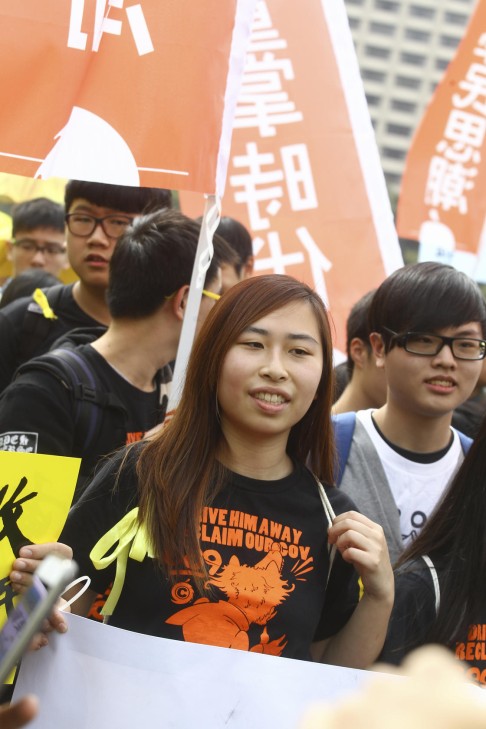
Gloria Cheng Yik-lam at last Sunday's pro-democracy rally. Photo: Dickson Lee
I WAS BORN INHONG KONG and, until 2013, when I left for Princeton University, in the United States, I lived and studied in the city. Over the years, I have heard many a criticism of Hong Kong's students. We have been called by some the "strawberry generation": soft, faint-hearted and easily bruised; stereotyped as quitters, poor communicators and self-centred. In December, I returned to interview some of the young Occupy activists because I wanted to understand the protesters as individuals and how they may be representative of a generation. I wanted to find out how they outplayed the adults, transforming what would have been a small-scale occupation of Central into a citywide "umbrella movement".
From 13,000km away, staring at my laptop screen in my dorm room, I had watched the events unfold at home. It was surreal to see familiar buildings and roads transformed by the crowds that engulfed them. My feelings were a curious mixture of detachment and intimacy, foreignness and familiarity.
My generation has been diagnosed with "Hong Kong kid syndrome", which is known to inflict the "three lows": low emotional intelligence, low resilience and a low level of independence. Employers write guides on how to deal with us. Two labels are also thrown around a lot, often disparagingly: the post-80s - those born in the 1980s - are criticised for having grown up in a greenhouse, being unable to stomach hardships, loving to complain and being irrational, among other things; and the post-90s - those born in the 90s, myself included - are lambasted for lacking a sense of personal responsibility being spoiled by so-called helicopter parents, who perpetually hover around their precious offspring, satisfying their every whim. Post-90s kids have even been known to take their parents to job interviews with them.
Somehow, these same groups had been responsible for starting a civil disobedience movement that captured the world's attention.
"There has always been a tendency to characterise students as immature, as unsophisticated," says Bruce MacFarlane, professor of higher education at the University of Hong Kong. "But, in fact, with what has happened, they have demonstrated the opposite.
"Within this current generation, there is a strong feeling of, if not now, when? If not me, who?"
Pushed on by socioeconomic pressures and a sense of urgency, the students have shown perseverance and courage, and have been unwilling to be discouraged by critics.
ON YOUTUBE, MORE THAN three weeks into the Occupy movement, I watched as student protest leaders and government officials sat down to debate the political future of Hong Kong. It was a stirring sight: five scruffy university students wearing identical black T-shirts emblazoned with the neon-green slogan "Freedom Now" taking on five government officials dressed in suits. The contrast between the two sides was indicative of a broader generational clash that came to a head on the streets of Admiralty, Causeway Bay and Mong Kok.
The officials had been groomed for success under the old Hong Kong system. Chief Secretary Carrie Lam Cheng Yuet-ngor grew up in a low-income family, doing homework on a bed because her family couldn't afford a desk. Secretary for Justice Rimsky Yuen Kwok-keung grew up in a public housing estate in Wong Tai Sin, sharing a 200 sq ft flat with his family of eight. For them, the "Hong Kong dream" - the hope that if you worked hard enough, you could make something of yourself - came true.
Now, though, "this group of youths feels that society is sinking," said Alex Chow Yong-kang, secretary general of the Hong Kong Federation of Students, in his opening remarks. "They have been so pushed up against the wall by the government that they have no other option. They must come onto the streets to fight, and only then will their voices be heard by the government."
Ninety minutes later, all the student debaters had heard from the government was "pack up and go home", said Lester Shum, deputy secretary general of the Hong Kong Federation of Students. "The whole generation, awakened by tear gas, cannot accept this. We are the generation chosen by the times. I think the same applies to you - you are the officials chosen by the times. Can you be responsible? Or will you be the ones that kill our political future and be the sinners of a thousand years?" said Shum, in his concluding remarks.
The tension spilled from the streets into homes. Cheng says she avoided bringing up political issues with her family during the Occupy period.
She grew up reading the newspapers regularly and watching the evening news with her family over dinner, she says, but "in secondary school, I wasn't politically involved. At some youth summits, I would talk to peers about current events, but it wasn't about standing out, or really expressing my own opinions. My political involvement was limited to the annual July 1 march, which I went to with my parents."
Then, in June 2012, she joined Scholarism to protest against the introduction of Beijing-endorsed "moral and national education" to the local curriculum. That year, tens of thousands - many of them students - gathered outside government headquarters to demand the withdrawal of the education plan, which, they said, was nothing more than brainwashing and indoctrination, and a threat to the integrity of their education. The plan was ultimately shelved but Cheng still felt that the voices of the people were not being heard.
"Over the years, we've tried marches, protests. When these rather ordinary, routine things ultimately did not work, civil disobedience was the last thing we could do. As Hong Kong citizens, of course, we wanted to do as much as we could," Cheng says.
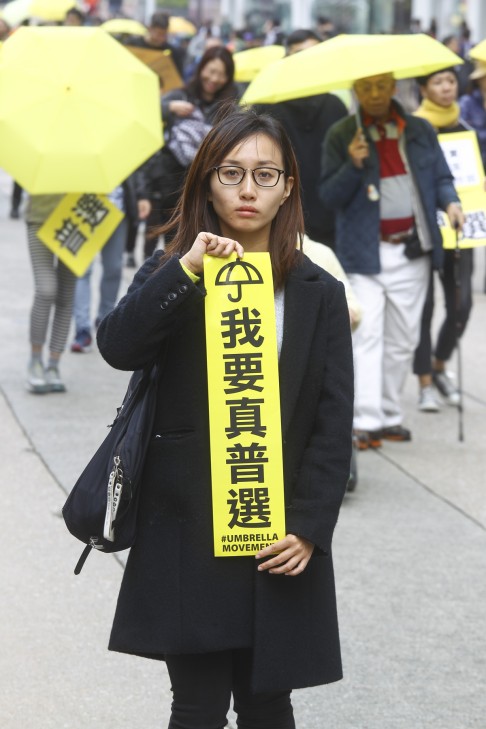
Evelyn Char. Photo: Dickson Lee
Cheng spent little time at home during the protests, only occasionally returning late at night to sleep and grab a bite to eat, leaving the next morning.
Other protesters "unfriended" family members on Facebook; a popular video online is of a female protester who purportedly unfriended her mother.
"For your last birthday, I bought you an iPhone so you could learn how to use Facebook. I didn't think I would unfriend you today," she says in the video. "I've also left the family's WhatsApp group." She talks about mounting economic pressures and a society that is "increasingly dark". Reality has changed, she tells her mother.
It is in part this belief - that things are not as they used to be and the opportunities that Hong Kong once offered its enterprising youth no longer exist - that has made the students want to take charge of their future.
Text messaging groups and Facebook feeds have become battlegrounds for warring opinions as those for and against the Occupy movement share articles from op-ed pages and blogs. The adults in my family (I have not unfriended them nor have I left our WhatsApp group) regularly share with me articles that are highly critical of the students. I have often found myself, tucked in bed, late at night, reading these articles on my iPhone and texting back point-by-point rebuttals, making the case for my fellow students who were on the streets.
But the conflict has never been as simple as a mere generational divide.
"Some think it is a clash of generations. Others think it is a clash of values. I think it is both," says Johannie Tong Hiu-yan, 20, who I meet at a Starbucks in Mong Kok.
Tong was among those who stormed Civic Square in September.
Tong first became aware of socioeconomic and democratic issues when, as a first-year student, she joined HKU's Federation of Social Work Students. She left the organisation in a regular rotation of personnel but was involved in organising the class boycott on campus in September. As the week-long boycott neared its end, she and others tried to think of a way to build on the momentum they had established.
"Originally, we were trying to think of some kind of action that would call Hong Kong people out, to tell them that the boycott was not only about students, that it did not revolve only around students," she says, sipping on a green tea latte.
Tong says that after two years of her being politically active at university, her parents were prepared for her involvement in the protests, being "supportive but sometimes worried", especially when certain areas, having been infiltrated by gang members, became dangerous and the crowds mob-like.
WATCHING OVER KOWLOON, Lion Rock is a 1,600-foot outcrop that resembles a big cat perching like a giant, benevolent guardian above the city. I hiked up the mountain in December, ignoring a warning sign, to climb onto the lion's head.
Since last October, climbers have hung a succession of giant yellow banners, ranging from six to 28 metres in length, from Lion Rock. Three of the banners read "I want genuine universal suffrage"; another "CY step down". A group calling itself Hong Kong Spidie has claimed responsibility for at least one of the banners, saying in a statement posted alongside a YouTube video that it aims to show that Hong Kong values democracy as much as it does money.
From atop Lion Rock, sweeping views of the city take in buildings that jut out of the landscape like candles jammed into a birthday cake. Interspersed between them are little mounds of green the city has learned to build around. Even up there, the constant rumble of vehicles can be heard.
The lion has watched the city change and develop over the years, and is a historical, geographical and cultural landmark; a keystone that symbolises the "Hong Kong dream" and the "Lion Rock spirit": the belief that anyone can become a somebody if they work hard enough. Now, squeezed by economic pressures such as sky-high property prices and stagnant salaries, many are finding that the dream is fading and the spirit is draining away.
"There's a strong sentiment of a lost generation, of lost hope," says Stephan Ortmann, a professor at City University who has written about the history of student activism in Hong Kong. Jobs are harder to come by, opportunities are diminishing. This sense of hopelessness, he believes, contributes to the mobilisation and political awakening of today's youth, "because they really want to do something about it".
And yet it would be wrong to assume that all of the protesters feel especially hard done by. Cheng, Tong and Char all say they have no financial worries at present.
"But even if [future economic concerns] don't affect me directly, it doesn't mean I won't care," says Char.
Chow, in fact, is a self-professed rich kid. Ming Pao newspaper discovered that his family's wealth totals nearly US$13 million, based on a clothing business that employs 3,600 people in China, Bangladesh and Vietnam. But it is because he has so much, he told Ming Pao, that he feels the responsibility to do something for society.
"When you can bear a higher cost, there's no reason not to come forward," he said.
"This Occupy movement, this civil disobedience movement was something I could afford," says Cheng, who took part knowing she might be arrested. She also put her health on the line by waging a six-day hunger strike.
The first two days were "easy, relaxed", she recalls. It was only when the winter wind blew with it "the smell of lunchboxes from neighbouring tents" that she felt pangs of hunger. Her stomach "actually dented inwards", she says. Her heart rate quickened and she slept poorly. By the fifth day, speaking and walking had become arduous.
"I would take a few steps, say a few words, and be winded," Cheng says.
As she walked off the stage after announcing the end of her hunger strike, she fainted.
The strike undertaken by Cheng and others failed to restart talks with the government. But, although it didn't last nearly as long as the epic fasts undertaken in the 20th century by members of the Indian independence movement and Irish Republicans, for example, Cheng believes it succeeded in showing the determination of the students.
"It brought a message to ordinary citizens: that we, as students, will persevere to do our utmost, to make an ethical complaint to the government. For a fairer electoral system, we take these actions," she says.
As a student majoring in government and public administration, Cheng does worry that her political activities might affect her career prospects.
"I've walked up front. There's a chance of having my details dug up by someone. I [can't even] think about working in the government," she says. "Not that I had any interest anyway."
A popular perception of those who took to the streets is that, in the main, they had little to lose because they were not the brightest or the best.
"Many people think youths who come out and make a movement like this are 'trash youths'," says Tong. "People think that only youths who have 'lost the game' are out on the streets. I don't think that is the case. There are many who play by the rules of the game, but even those who have won … see the problems and want change."
She points to herself - a third-year student majoring in social work at HKU - and protesters from the similarly respected Chinese University, as examples, and says they can't justifiably be called "trash youths".
Tong says she feels stilted by the socially constructed standards used to judge students - that they should some day "be professionals, live a materialistic life and be defined by their academic qualifications" - and sees a distinct lack of choices and opportunities in Hong Kong for all of the city's young.
"We can all see that society can't fulfil our interests, desires and needs, and so when all the youths think this way, we want change."
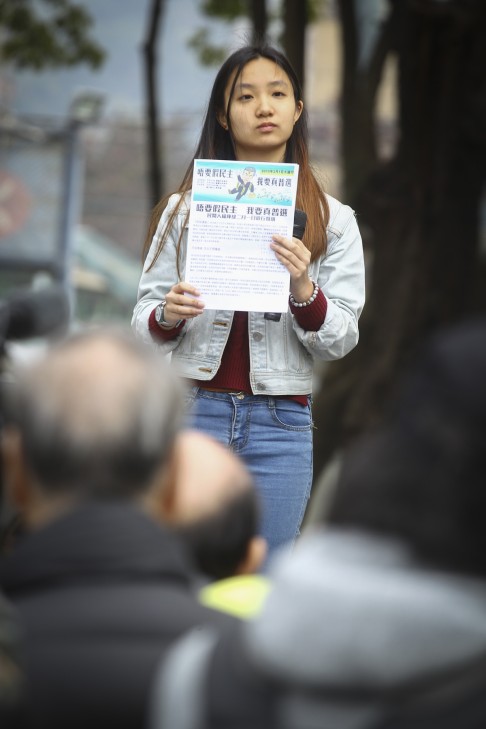
Johannie Tong. Photo: Dickson Lee
ON NEW YEAR'S EVE, under a clear night sky and skyscrapers adorned with holiday lighting, a crowd gathered at an oval-shaped plaza by the harbour, several hundred metres from Civic Square, where the umbrella movement had been born three months earlier. Holding yellow umbrellas and balloons, the crowd, several hundred strong at first, eventually growing to more than a thousand, was there to hear Bananaooyoo ("banana milk", in Chinese) perform.
Bananaooyoo is the stage name of Shum Wai-lun, 24, who had been singing on the streets with his guitar throughout the protests. Slimly built with a brow-length fringe and large, round, black-rimmed glasses, he graduated with a law degree from HKU but gave up on being a lawyer because, he says, he found justice, as practised in the corporate legal world, to be lofty, pretentious and empty. He decided to work in the arts instead, as a part-time actor and administrator, substituting his income by tutoring on the side.
"The banana represents positive energy [although it's unclear to many locals how], milk represents childhood innocence," Shum writes on his Facebook page.
Amid political polarisation in a deeply divided society, Hongkongers, it could be argued, are in need of a good dose of each.
On that final night of 2014, Shum sang song after song as the audience swayed, waving smartphone flashlights in the air. Some held up lights against their balloons, rendering them a glowing, translucent yellow. Between songs, the crowd would, from time to time, chant, "I want genuine universal suffrage."
Speaking to these young female protesters has transformed a few of the nameless, faceless blurs I saw on my laptop in Princeton into real individuals, each with their own stories and motivations. Their future and that of their city are intricately bound, and they are driven by a desire for change to take unprecedented risks.
When I ask Cheng what her biggest gain from the umbrella movement has been, she chuckles.
"Gains? I don't think there were too many gains, but there have been a lot of sacrifices," she says. "I've seen tear gas, I've been hit by pepper spray. All these are experiences you don't particularly want to have, but they are life experiences."
Char believes she has come out of the protest movement more empathetic and understanding.
"I can say without shame that having gone through these few months, I think I've become better as a person." She is more willing to put herself in the shoes of others, she says - "even those of opposing camps or factions".
"In terms of legacy, I still don't know. It's not necessarily good. Differences and divides have grown."
For Tong, the movement has fostered personal growth.
"There are things I didn't think I could do before. But after all this, you find that you've become tougher, that you can do it," she says. "Being able to participate in such a symbolic and historically significant movement is in itself a gain. There is pleasure in it, so I have no regrets."
And although, for now, no concrete policy gains have been made as a direct result of Occupy (and the turnout at last weekend's democracy rally suggests people are losing faith with the usual methods of protest), this generation of students has shown that they are no strawberries - and they are not easily bruised.
"For better or worse, there has been a political awakening," Char says.
As midnight approached, Shum launched into a classic from the 1990s by rock band Beyond, titled Golden Age. Holiday lights shone overhead, the brightly lit Ferris wheel turned slowly in the distance and, as a year marked by tumultuous social and political upheavals ticked towards its end, the audience joined in:
"Today there remains only an empty shell
To greet the golden age
Holding on to freedom in the wind and rain
A lifetime of struggling helplessly
Confidence can change the future
We ask, who can do it?"
About the author
Hong Kong-born Mary Hui Kam-man attended South Island School until 2010, then Li Po Chun United World College, in Wu Kai Sha. In 2013, she left her Happy Valley home for a four-year degree course at Princeton University, in the United States. "I haven't declared my major yet but I intend to study politics and Spanish," she says.
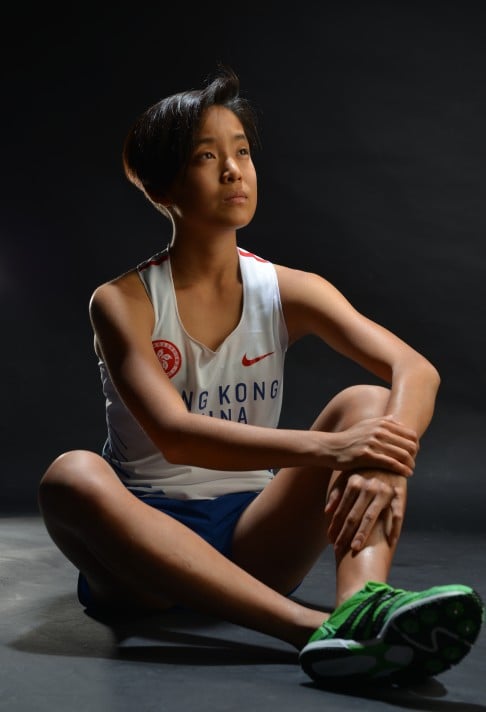
Mary Hui is a student athlete. Photo: Thomas Yau
Hui chose Princeton because it had a strong sporting background; when she left, she held the Hong Kong junior record for both the 3,000-metre steeplechase and 15km run, and had represented the city four times in athletics events.
Hui says she intends to return to Hong Kong to live eventually: "I plan on working abroad for a few years first, though."
- Joined
- Jun 16, 2013
- Messages
- 58
- Points
- 0
Re: Hong Kong Students indefinite hunger strike secrets revealed
Beijing criticised for publication of new series of anti-Occupy books
PUBLISHED : Sunday, 08 March, 2015, 11:52pm
UPDATED : Sunday, 08 March, 2015, 11:52pm
Jeffie Lam [email protected]
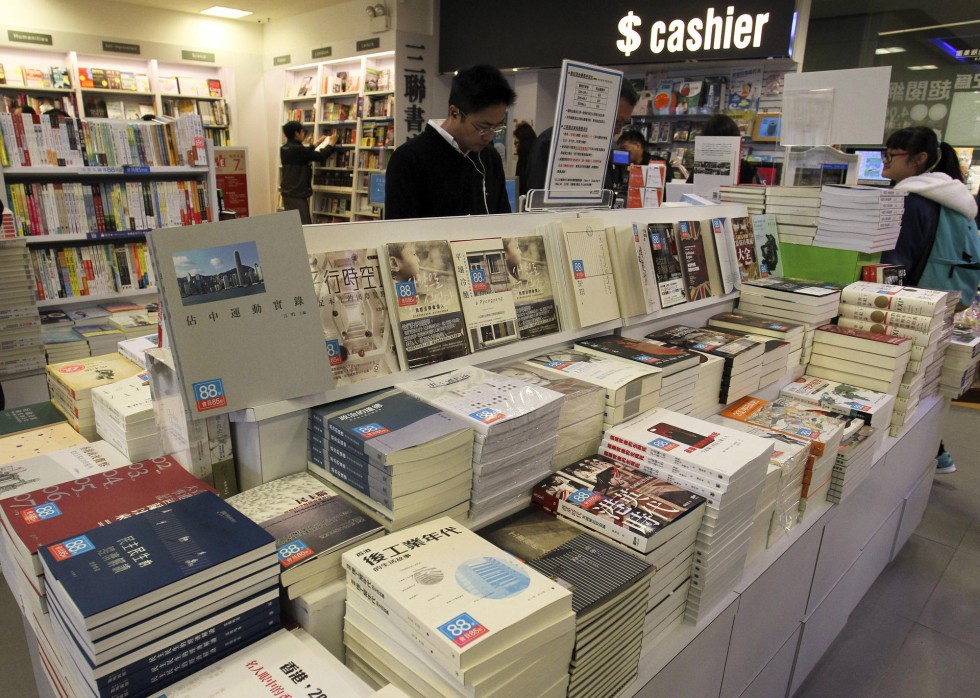
Anti-Occupy books in a Joint Publishing store.Photo: Dickson Lee
Beijing has been accused of launching a new propaganda war by putting pressure on a leading publisher to release a series of books with an apparent antiOccupy agenda.
The emergence of at least five books - all published and distributed by subsidiaries of Sino United Publishing - came as the 27-year-old publisher faces allegations of not selling books written by pro-democracy authors in its 51 Hong Kong shops, operated through its subsidiaries Joint Publishing, Chung Hwa Book and Commercial Press.
Books which claim to uncover the secrets of last year's Occupy protests are easily visible in prominent areas of the stores. Closer study, however, suggests they all contain passages heavily critical of the 79-day sit-in which finally ended in December.
The free speech group Independent Commentators Association has hit out at one book, whose title translates as Looking Into Occupy Central, written by Kwan Sau-king, for accusing the association of receiving funds from the National Endowment for Democracy, a group sponsored by the US Congress to promote democracy abroad.
The book also targets former reporter Bruce Lui Ping-kuen, now a journalism lecturer at Baptist University and a member of the association, for apparently exaggerating a negative slant on the mainland when covering China affairs.
The association last week demanded Kwan delete all allegedly false statements within seven days or face legal action. Kwan and Joint Publishing - which published the book - said they could not comment.
Another book, whose title translates as Decrypting Occupy Central, is said to have been written by Poon Tin-long and was published by Sinminchu Publishing, another subsidiary of Sino United. It claimed the so-called umbrella movement was a "colour revolution" - such as those in former Soviet states - manipulated by Western forces.
Veteran China watcher Johnny Lau Yui-siu said Beijing wanted to tighten its control of Hong Kong through publishing in the aftermath of the Occupy protests.
"Occupy might have ended but its impact remains," he said. He added Sino United's move to publish books against the movement and not sell those in favour "is apparently an order [from] beyond the publisher itself".
Occupy Central co-founder Dr Chan Kin-man expressed concern about the situation.
"People might not easily be aware that what is being displayed in the [major] bookstores is already the result of censorship. They thought they had choices," he said.
Beijing criticised for publication of new series of anti-Occupy books
PUBLISHED : Sunday, 08 March, 2015, 11:52pm
UPDATED : Sunday, 08 March, 2015, 11:52pm
Jeffie Lam [email protected]

Anti-Occupy books in a Joint Publishing store.Photo: Dickson Lee
Beijing has been accused of launching a new propaganda war by putting pressure on a leading publisher to release a series of books with an apparent antiOccupy agenda.
The emergence of at least five books - all published and distributed by subsidiaries of Sino United Publishing - came as the 27-year-old publisher faces allegations of not selling books written by pro-democracy authors in its 51 Hong Kong shops, operated through its subsidiaries Joint Publishing, Chung Hwa Book and Commercial Press.
Books which claim to uncover the secrets of last year's Occupy protests are easily visible in prominent areas of the stores. Closer study, however, suggests they all contain passages heavily critical of the 79-day sit-in which finally ended in December.
The free speech group Independent Commentators Association has hit out at one book, whose title translates as Looking Into Occupy Central, written by Kwan Sau-king, for accusing the association of receiving funds from the National Endowment for Democracy, a group sponsored by the US Congress to promote democracy abroad.
The book also targets former reporter Bruce Lui Ping-kuen, now a journalism lecturer at Baptist University and a member of the association, for apparently exaggerating a negative slant on the mainland when covering China affairs.
The association last week demanded Kwan delete all allegedly false statements within seven days or face legal action. Kwan and Joint Publishing - which published the book - said they could not comment.
Another book, whose title translates as Decrypting Occupy Central, is said to have been written by Poon Tin-long and was published by Sinminchu Publishing, another subsidiary of Sino United. It claimed the so-called umbrella movement was a "colour revolution" - such as those in former Soviet states - manipulated by Western forces.
Veteran China watcher Johnny Lau Yui-siu said Beijing wanted to tighten its control of Hong Kong through publishing in the aftermath of the Occupy protests.
"Occupy might have ended but its impact remains," he said. He added Sino United's move to publish books against the movement and not sell those in favour "is apparently an order [from] beyond the publisher itself".
Occupy Central co-founder Dr Chan Kin-man expressed concern about the situation.
"People might not easily be aware that what is being displayed in the [major] bookstores is already the result of censorship. They thought they had choices," he said.
- Joined
- Jun 16, 2013
- Messages
- 58
- Points
- 0
Re: Hong Kong Students indefinite hunger strike secrets revealed
Police launch internal review of how they handled Occupy Central protests
Long-serving officer heads internal review of how police handled Occupy movement amid fears of repeat demonstrations on anniversary
PUBLISHED : Sunday, 15 March, 2015, 3:23am
UPDATED : Sunday, 15 March, 2015, 3:23am
Niall Fraser [email protected]
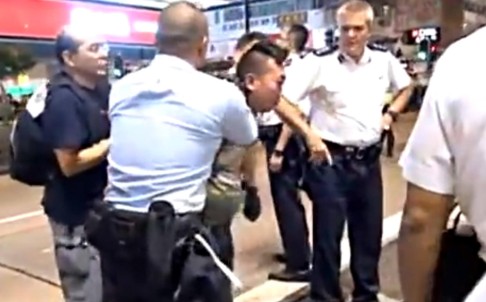
Duncan McCosh (centre) at Occupy protests. Photo: SMP
A major internal review is under way into how Hong Kong police handled last year's Occupy Central protests which could re-shape the way the city's 28,000-strong force deals with such protests in future.
The probe is being headed by long-serving officer Duncan McCosh whose appointment could reopen the bitter debate over the controversial role the force played during the three months of turmoil given he was closely involved in the planning, execution and eventual clearance of demonstrators.
The review - which will be carried out by a team of seven officers under McCosh's command and is expected to come up with a series of recommendations by the end of April - comes amid top-level concerns that the city could be gripped by repeat protests to mark the first anniversary of the Occupy movement.
Earlier this week Legislative Council president and veteran pro-Beijing politician Jasper Tsang Yok-shing told Japanese media that he expected "big protests'' to mark the anniversary and suggested now was the time for the government and students to engage in some form of dialogue to defuse the situation.
It also comes amid increasingly radical protests against the influx of so-called parallel traders from the mainland, including a plan to hijack today's open day at Government House.
McCosh, who was previously deputy regional commander for Kowloon West, declined a Sunday Morning Post request for an interview about his role.
But a police spokesman said the review "involves the collation and reflection of experiences and opinions drawn from force members directly involved at all stages of the operation together with conclusions and recommendations that arise".
As for the creation of a special high-ranking post to head up the probe, the spokesman said: "The post was created to strengthen police's command responsibilities for operations which required significant mobilisation and deployment of force resources over a sustained period of time, and the related post-operational matters, such as external inquiries and reviews.''
One officer with more than 25 years' service in the force said: "This looks like a means of keeping a permanent anti-protest/riot capability at both management and rank-and-file level.''
However, another officer, who declined to be identified, said: "What some in the force find difficult to understand is why we have someone conducting this review who was specifically tasked before Occupy Central with the tactics and planning for it; and was then involved in policing the actual event itself.''
The police spokesman declined to answer questions on McCosh's suitability for the job, saying: "We would not comment on the promotion of individual civil servants.''
Last month the Post revealed that the police force was to receive its biggest single injection of manpower in years with the addition of 500 new officer posts - in a move primarily aimed at strengthening the specialist unit that handles public order events.
The move was given the green light by the Security Bureau - and would see 500 new positions added to the force's current "establishment" of 28,726, most of which would be used to boost the Police Tactical Unit, which at present has 2,000 officers.
Police launch internal review of how they handled Occupy Central protests
Long-serving officer heads internal review of how police handled Occupy movement amid fears of repeat demonstrations on anniversary
PUBLISHED : Sunday, 15 March, 2015, 3:23am
UPDATED : Sunday, 15 March, 2015, 3:23am
Niall Fraser [email protected]

Duncan McCosh (centre) at Occupy protests. Photo: SMP
A major internal review is under way into how Hong Kong police handled last year's Occupy Central protests which could re-shape the way the city's 28,000-strong force deals with such protests in future.
The probe is being headed by long-serving officer Duncan McCosh whose appointment could reopen the bitter debate over the controversial role the force played during the three months of turmoil given he was closely involved in the planning, execution and eventual clearance of demonstrators.
The review - which will be carried out by a team of seven officers under McCosh's command and is expected to come up with a series of recommendations by the end of April - comes amid top-level concerns that the city could be gripped by repeat protests to mark the first anniversary of the Occupy movement.
Earlier this week Legislative Council president and veteran pro-Beijing politician Jasper Tsang Yok-shing told Japanese media that he expected "big protests'' to mark the anniversary and suggested now was the time for the government and students to engage in some form of dialogue to defuse the situation.
It also comes amid increasingly radical protests against the influx of so-called parallel traders from the mainland, including a plan to hijack today's open day at Government House.
McCosh, who was previously deputy regional commander for Kowloon West, declined a Sunday Morning Post request for an interview about his role.
But a police spokesman said the review "involves the collation and reflection of experiences and opinions drawn from force members directly involved at all stages of the operation together with conclusions and recommendations that arise".
As for the creation of a special high-ranking post to head up the probe, the spokesman said: "The post was created to strengthen police's command responsibilities for operations which required significant mobilisation and deployment of force resources over a sustained period of time, and the related post-operational matters, such as external inquiries and reviews.''
One officer with more than 25 years' service in the force said: "This looks like a means of keeping a permanent anti-protest/riot capability at both management and rank-and-file level.''
However, another officer, who declined to be identified, said: "What some in the force find difficult to understand is why we have someone conducting this review who was specifically tasked before Occupy Central with the tactics and planning for it; and was then involved in policing the actual event itself.''
The police spokesman declined to answer questions on McCosh's suitability for the job, saying: "We would not comment on the promotion of individual civil servants.''
Last month the Post revealed that the police force was to receive its biggest single injection of manpower in years with the addition of 500 new officer posts - in a move primarily aimed at strengthening the specialist unit that handles public order events.
The move was given the green light by the Security Bureau - and would see 500 new positions added to the force's current "establishment" of 28,726, most of which would be used to boost the Police Tactical Unit, which at present has 2,000 officers.
- Joined
- Jun 16, 2013
- Messages
- 58
- Points
- 0
Re: Hong Kong Students indefinite hunger strike secrets revealed
Party emerges from Occupy to fight district elections
Emerging from the Occupy protests, Youngspiration aims to field eight candidates in district polls
PUBLISHED : Sunday, 15 March, 2015, 11:00pm
UPDATED : Monday, 16 March, 2015, 5:46am
Joyce Ng [email protected]
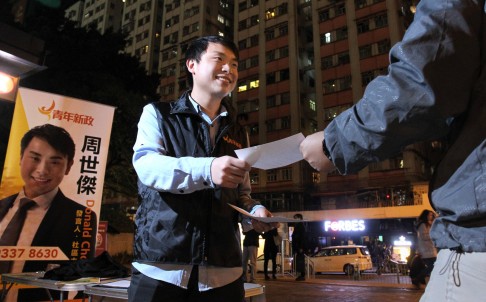
Youngspiration spokesman Donald Chow Sai-kit hands out questionnaires to residents in Kennedy Town, where he intends to stand in the district council elections. Photo: May Tse
A new political group formed by Occupy movement protesters is planning to contest at least eight seats in the district council election, two of which are also targeted by the Democratic Party.
The clash is unintended, says Youngspiration's spokesman Donald Chow Sai-kit, 23, who said the group would take the democratic spirit of Occupy into the community and be independent of traditional political parties' "old ways of thinking".
Youngspiration is one of several political groups emerging from the 79-day sit-ins for universal suffrage. With 140 members already, it has started work in some neighbourhoods but will officially launch later this month.
Chow, who is studying business administration at university, said: "We want to continue the culture developed in the protest zones, where people made decisions with a bottom-up approach, rather than let a few leaders dominate."
That culture could take root in the community through forums so that residents could have an active say in local affairs, added Chow, who was involved in the now-defunct pro-democracy Secondary Students' Union.
Chow said the group was inspired by the lively "chit-chat sessions" that happened spontaneously among the crowds at the protest sites. The district council election would be a stepping stone to a harder fight to get into the Legislative Council and reinstate Hongkongers' identity and values, Chow said.
Apart from upholding freedoms and rights, localist issues will be on their agenda, like priority for Hongkongers in housing policy, promotion of the Cantonese dialect and use of traditional Chinese characters.
Its candidates in the November election will seek to unseat pro-establishment incumbents in constituencies including Kwun Lung and Kennedy Town and Mount Davis in Central and Western District; Tai Nan in Yau Tsim Mong District; Whampoa East in Kowloon City District; and three other constituencies in Kwai Tsing District.
In at least two of these constituencies, Youngspiration will run into the Democratic Party's candidates - a clash that has concerned pan-democrats. The new group says it would prefer not to join an existing "co-ordination mechanism" that aims to prevent candidates from different pan-democratic parties competing in the same area, which can affect vote share and hand victory to pro-establishment rivals.
Chow will run for the Kennedy Town and Mount Davis seat, against incumbent Chan Hok-fung of the Beijing-friendly Democratic Alliance for the Betterment and Progress of Hong Kong. Understood to be going up against Chan is a new Democratic Party recruit and another Occupy protester.
The Democrats will also be fielding a candidate for the Tai Nan constituency.
"We don't want to snatch the votes from pan-democrats in areas where they have a long history or a high chance of winning," said Chow. "But I grew up [in Kennedy Town] and I want to work for the place I feel attached to and I didn't know the Democrats had a new member here."
Democrat Winfield Chong Wing-fai said his party had a long record of community work in Kennedy Town although he lost to the DAB in 2007 and a colleague lost in 2011.
"I'd say if two pro-democracy forces clash in the same area, either's chance of winning will be reduced," Chong said. "Anyone intending to run should make it their priority to snatch votes from the pro-establishment."
Party emerges from Occupy to fight district elections
Emerging from the Occupy protests, Youngspiration aims to field eight candidates in district polls
PUBLISHED : Sunday, 15 March, 2015, 11:00pm
UPDATED : Monday, 16 March, 2015, 5:46am
Joyce Ng [email protected]

Youngspiration spokesman Donald Chow Sai-kit hands out questionnaires to residents in Kennedy Town, where he intends to stand in the district council elections. Photo: May Tse
A new political group formed by Occupy movement protesters is planning to contest at least eight seats in the district council election, two of which are also targeted by the Democratic Party.
The clash is unintended, says Youngspiration's spokesman Donald Chow Sai-kit, 23, who said the group would take the democratic spirit of Occupy into the community and be independent of traditional political parties' "old ways of thinking".
Youngspiration is one of several political groups emerging from the 79-day sit-ins for universal suffrage. With 140 members already, it has started work in some neighbourhoods but will officially launch later this month.
Chow, who is studying business administration at university, said: "We want to continue the culture developed in the protest zones, where people made decisions with a bottom-up approach, rather than let a few leaders dominate."
That culture could take root in the community through forums so that residents could have an active say in local affairs, added Chow, who was involved in the now-defunct pro-democracy Secondary Students' Union.
Chow said the group was inspired by the lively "chit-chat sessions" that happened spontaneously among the crowds at the protest sites. The district council election would be a stepping stone to a harder fight to get into the Legislative Council and reinstate Hongkongers' identity and values, Chow said.
Apart from upholding freedoms and rights, localist issues will be on their agenda, like priority for Hongkongers in housing policy, promotion of the Cantonese dialect and use of traditional Chinese characters.
Its candidates in the November election will seek to unseat pro-establishment incumbents in constituencies including Kwun Lung and Kennedy Town and Mount Davis in Central and Western District; Tai Nan in Yau Tsim Mong District; Whampoa East in Kowloon City District; and three other constituencies in Kwai Tsing District.
In at least two of these constituencies, Youngspiration will run into the Democratic Party's candidates - a clash that has concerned pan-democrats. The new group says it would prefer not to join an existing "co-ordination mechanism" that aims to prevent candidates from different pan-democratic parties competing in the same area, which can affect vote share and hand victory to pro-establishment rivals.
Chow will run for the Kennedy Town and Mount Davis seat, against incumbent Chan Hok-fung of the Beijing-friendly Democratic Alliance for the Betterment and Progress of Hong Kong. Understood to be going up against Chan is a new Democratic Party recruit and another Occupy protester.
The Democrats will also be fielding a candidate for the Tai Nan constituency.
"We don't want to snatch the votes from pan-democrats in areas where they have a long history or a high chance of winning," said Chow. "But I grew up [in Kennedy Town] and I want to work for the place I feel attached to and I didn't know the Democrats had a new member here."
Democrat Winfield Chong Wing-fai said his party had a long record of community work in Kennedy Town although he lost to the DAB in 2007 and a colleague lost in 2011.
"I'd say if two pro-democracy forces clash in the same area, either's chance of winning will be reduced," Chong said. "Anyone intending to run should make it their priority to snatch votes from the pro-establishment."
- Joined
- Jun 16, 2013
- Messages
- 58
- Points
- 0
Re: Hong Kong Students indefinite hunger strike secrets revealed
Hong Kong courts 'impartial' in face of Occupy movement, says Beijing think tank report
Injunction orders to clear protest sites boosted confidence in rule of law, mainland report says
PUBLISHED : Thursday, 19 March, 2015, 1:16am
UPDATED : Thursday, 19 March, 2015, 1:16am
Peter So and Tony Cheung
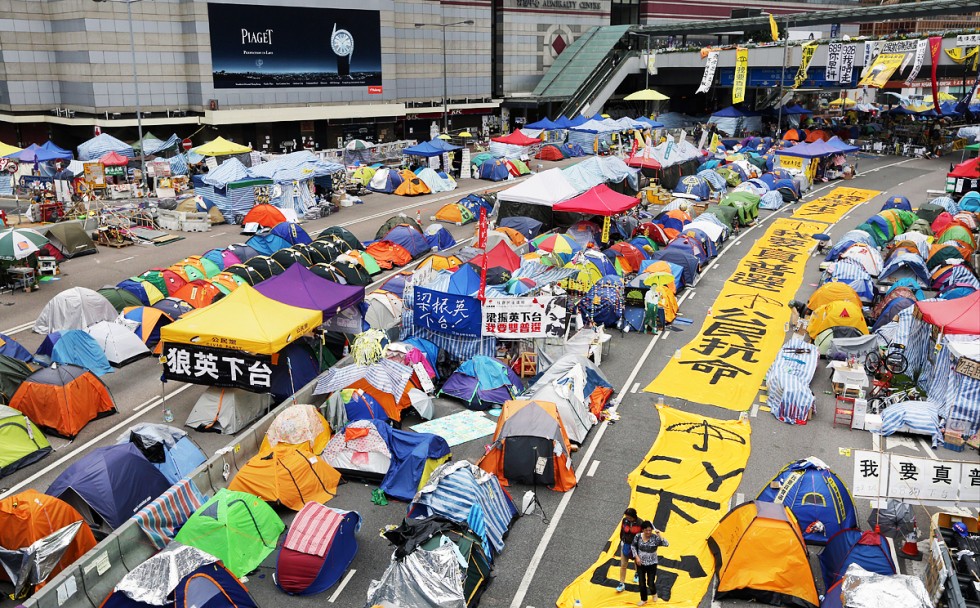
Tents are set up by pro-democracy protesters at protest site in Admiralty during the Occupy Central movement in this file photo taken on December 7, 2014. Photo: Sam Tsang
Courts in Hong Kong could remain impartial when handling cases relating to last year's Occupy Central movement although the pro-democracy protests had sparked concerns on respect for the city's rule of law, according to a report by a Beijing think tank.
A chapter on Hong Kong in the latest blue book on nationwide rule of law, published yesterday by the Chinese Academy of Social Sciences, said the illegal blockade of roads in pursuit of democracy constituted "the biggest challenge to the city's rule of law" since the 1997 handover.
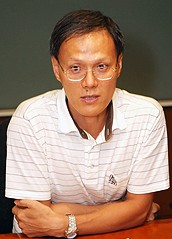
Lin Feng
But the chapter's writer, Professor Lin Feng, associate dean of the school of law at City University in Hong Kong, concluded that the performance of courts in ruling on applications for injunctions to clear protest sites had "boosted people's confidence on the future of the rule of law in Hong Kong".
Lin's assessment was in stark contrast to that of academy legal scholar Chen Xinxin who previously argued that the 79-day civil disobedience movement - which tried to force Beijing to change its stringent framework for the 2017 chief executive election - undermined the rule of law.
"The deliberate illegal behaviour [by protesters] would give other people a wrong impression that they would not be arrested as long as there were enough people participating in the illegal movement," Lin wrote. "The rule of law would have been eroded if that illegal behaviour had become common in the community."
He added: "Fortunately, the judiciary in Hong Kong has maintained its impartiality and independence even in handling the cases relating to Occupy movement."
Lin, who stressed that his paper did not represent the views of the central government, told the South China Morning Post that Hongkongers had continued to respect the rule of law. "I think the Occupy movement was an individual case … it did not bring a huge negative impact to the city's core value," he said.
Lin also said genuine universal suffrage could be achieved by reforming the composition of and election methods for the 1,200-strong nominating committee. The committee will be tasked with approving two or three candidates for the 2017 poll.
Civic Party lawmaker Ronny Tong Ka-wah, a barrister, said the blue book statement on Occupy Central was "relatively fair".
During Occupy, he said, many pro-establishment politicians and legal experts were worried "because many people refused to accept the court's injunctions, but this problem doesn't exist any more. Occupy also ended because of an injunction".
Hong Kong courts 'impartial' in face of Occupy movement, says Beijing think tank report
Injunction orders to clear protest sites boosted confidence in rule of law, mainland report says
PUBLISHED : Thursday, 19 March, 2015, 1:16am
UPDATED : Thursday, 19 March, 2015, 1:16am
Peter So and Tony Cheung

Tents are set up by pro-democracy protesters at protest site in Admiralty during the Occupy Central movement in this file photo taken on December 7, 2014. Photo: Sam Tsang
Courts in Hong Kong could remain impartial when handling cases relating to last year's Occupy Central movement although the pro-democracy protests had sparked concerns on respect for the city's rule of law, according to a report by a Beijing think tank.
A chapter on Hong Kong in the latest blue book on nationwide rule of law, published yesterday by the Chinese Academy of Social Sciences, said the illegal blockade of roads in pursuit of democracy constituted "the biggest challenge to the city's rule of law" since the 1997 handover.

Lin Feng
But the chapter's writer, Professor Lin Feng, associate dean of the school of law at City University in Hong Kong, concluded that the performance of courts in ruling on applications for injunctions to clear protest sites had "boosted people's confidence on the future of the rule of law in Hong Kong".
Lin's assessment was in stark contrast to that of academy legal scholar Chen Xinxin who previously argued that the 79-day civil disobedience movement - which tried to force Beijing to change its stringent framework for the 2017 chief executive election - undermined the rule of law.
"The deliberate illegal behaviour [by protesters] would give other people a wrong impression that they would not be arrested as long as there were enough people participating in the illegal movement," Lin wrote. "The rule of law would have been eroded if that illegal behaviour had become common in the community."
He added: "Fortunately, the judiciary in Hong Kong has maintained its impartiality and independence even in handling the cases relating to Occupy movement."
Lin, who stressed that his paper did not represent the views of the central government, told the South China Morning Post that Hongkongers had continued to respect the rule of law. "I think the Occupy movement was an individual case … it did not bring a huge negative impact to the city's core value," he said.
Lin also said genuine universal suffrage could be achieved by reforming the composition of and election methods for the 1,200-strong nominating committee. The committee will be tasked with approving two or three candidates for the 2017 poll.
Civic Party lawmaker Ronny Tong Ka-wah, a barrister, said the blue book statement on Occupy Central was "relatively fair".
During Occupy, he said, many pro-establishment politicians and legal experts were worried "because many people refused to accept the court's injunctions, but this problem doesn't exist any more. Occupy also ended because of an injunction".
Similar threads
- Replies
- 17
- Views
- 1K
- Replies
- 4
- Views
- 397
- Replies
- 3
- Views
- 366
- Replies
- 6
- Views
- 837
